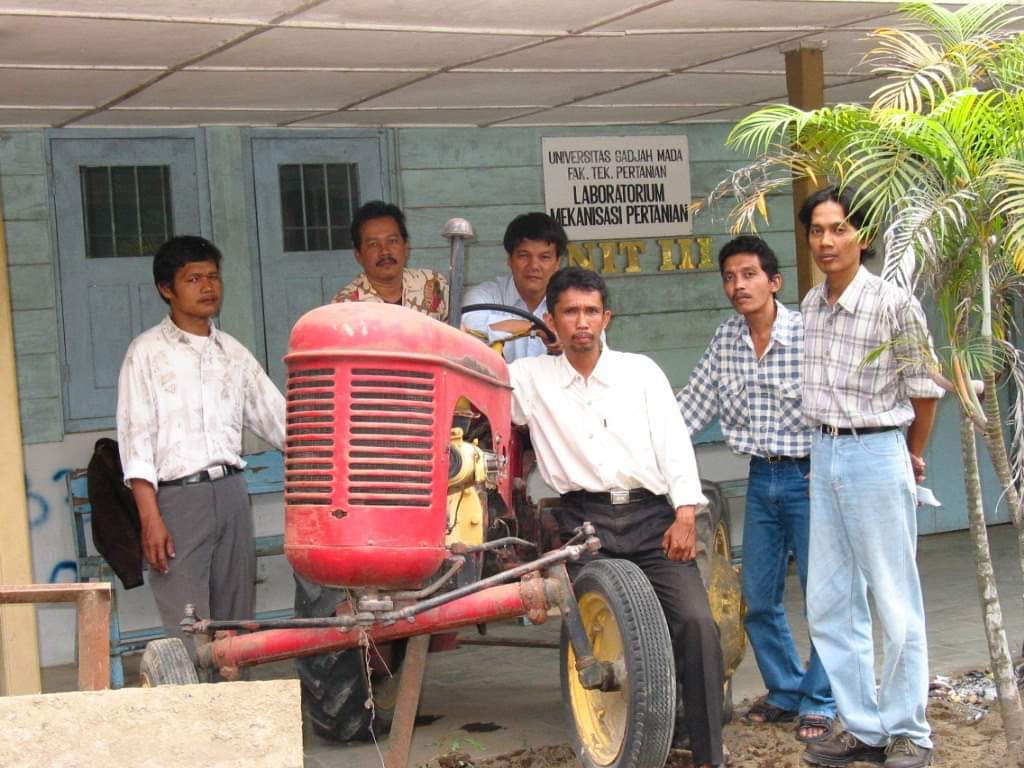Universitas Gadjah Mada (UGM), when it was founded on December 19, 1949, initially consisted of five faculties. Today, UGM has expanded to 18 faculties, one of which is the Faculty of Agricultural Technology. The Department of Agricultural & Biosystems Engineering is one of the three departments within the Faculty of Agricultural Technology. The other two departments are the Department of Food and Agricultural Product Technology (TPHP) and the Department of Agricultural Industrial Technology (TIP). Tracing the history of the Department of Department of Agricultural & Biosystems Engineering cannot be separated from the history of the Faculty of Agricultural Technology.
The Faculty of Agricultural Technology at Universitas Gadjah Mada was established on September 19, 1963, as the realization of Ministerial Decree No. 99 dated August 17, 1963. According to the decree, the Faculty of Agriculture and Forestry at Universitas Gadjah Mada was divided into three faculties:
(i) the Faculty of Agriculture,
(ii) the Faculty of Forestry, and
(iii) the Faculty of Agricultural Technology.
Furthermore, the Faculty of Agricultural Technology was formed from two sections that previously existed within the Faculty of Agriculture and Forestry: (i) the Agricultural Technology Section and (ii) the Cultural Engineering Section. Based on historical developments at that time, the Faculty of Agricultural Technology at Universitas Gadjah Mada was the first faculty in Indonesia dedicated to agricultural technology.
As previously mentioned, when it was first established, the Faculty of Agricultural Technology consisted of two divisions: (i) the Agricultural Technology Division and (ii) the Agricultural Mechanization Division. The Agricultural Technology Division had five departments: (i) Basic and Raw Material Technology, (ii) Vegetable and Fruit Technology, (iii) Animal-Based Product Technology, (iv) Industrial Microbiology, and (v) Other Food Material Technology. Meanwhile, the Agricultural Mechanization Division had two departments: (i) Soil and Water Conservation and (ii) Agricultural Machinery and Equipment.
Some of the founding figures and faculty members of the Faculty of Agricultural Technology at that time included Prof. Kamarijani, Prof. Soenjoto Soemodihardjo, Prof. Dr. Ir. Moch. Adnan, MSc., Ir. Hendro Pawoko Sajid, Ir. Soeharsono Martoharsono, Ir. Amien Hidayat, Ir. Hardiman, MSc., Ir. Moch. Roesdi, Ir. Soemangat, MSc., Ir. Pratjojo, Ir. Salam, MSc., Ir. Soenarto Pronohadiprodjo, and Ir. Pamudji. The faculty produced its first graduates on February 6, 1966.
Changes were made to the names of the departments within the Faculty of Agricultural Technology. Since then, the Agricultural Technology Division had four departments: (i) Hard Crop Technology, (ii) Soft Crop Technology, (iii) Animal Product Technology, and (iv) Industrial Microbiology. Meanwhile, the Agricultural Mechanization Division had two departments: (i) Soil and Water Conservation Engineering and (ii) Power and Agricultural Machinery Engineering.
The credit system was officially implemented at Universitas Gadjah Mada, and the education program, which was initially six years (comprising a four-year baccalaureate program and a two-year undergraduate program), was changed to a four-year undergraduate (S-1) program. At that time, the Agricultural Technology Division was renamed the Agricultural Product Processing Division, while the Agricultural Mechanization Division remained unchanged. The undergraduate education program in the Agricultural Product Processing Division was divided into two specializations: (i) Food Science and Technology and (ii) Plantation Technology. Meanwhile, the specializations in the Agricultural Mechanization Division included (i) Power and Agricultural Machinery, (ii) Agricultural Product Processing Engineering, and (iii) Soil and Water Conservation Engineering.
Based on Government Regulation No. 5 of 1980, the term “Division” was changed to “Department,” resulting in the Faculty of Agricultural Technology having two departments: the Department of Agricultural Product Processing and the Department of Agricultural Mechanization. Subsequently, according to Decree No. 221/DIKTI/Kep/1996 dated July 11, 1996, the Agricultural Mechanization Program was renamed the Agricultural Engineering Program.
To support the implementation of education, research, and community service activities, the Department of Agricultural Engineering expanded its academic infrastructure by establishing five laboratories:

In 2003, the Faculty of Agricultural Technology at UGM received additional facilities, including new buildings and equipment from JBIC-OECF, which improved the quality of lectures, research, practicums, and other supporting activities. To further develop its academic programs, the Agricultural Engineering Department applied for various grant programs and established several collaborations. The department participated in the SP4 grant program and successfully received funding for the 2004 and 2005 fiscal years. The successful implementation of the SP4 Program over two years enabled the Agricultural Engineering Department to compete in the Higher Education Competitive Grant Program (PHK Dikti), securing PHK A3 funding for three years (2006–2008). These external grants were aimed at strengthening the Agricultural Engineering Program, particularly at the undergraduate (S-1) level, to improve both internal and external efficiency.
Several collaborations with private and government institutions, both domestic and international, have been established by the Department of Agricultural Engineering. These include partnerships with IWMI, JICA, OECF, FAO, the Ministry of Public Works, the Ministry of Agriculture, and the Ministry of Industry. Although not yet fully optimized, these activities have significantly contributed to the department’s development in terms of funding, academic program implementation, and its overall reputation.